Minimalism and sustainability go hand in hand, allowing you to simplify your life while greatly reducing your environmental impact. By focusing on quality over quantity, you’ll appreciate your possessions more and make mindful choices that align with your values. This lifestyle cuts waste, supports eco-friendly products, and promotes a smaller carbon footprint. Embracing minimalism can even lead to financial freedom. Discover practical steps to live with less and embrace a more sustainable lifestyle.
Key Takeaways
- Minimalism promotes intentional living by reducing consumption, which directly aligns with sustainable practices and lowers resource depletion.
- Choosing quality over quantity leads to durable products, minimizing waste and supporting eco-friendly initiatives.
- Adopting a minimalist lifestyle reduces personal waste, including packaging and single-use plastics, contributing to environmental preservation.
- Smaller living spaces encourage energy efficiency, while a focus on experiences over possessions can enhance both financial and emotional well-being.
- Community engagement in sustainable practices amplifies the impact of minimalism, fostering collective efforts towards eco-friendly habits and initiatives.
Understanding Minimalism: A Lifestyle Choice
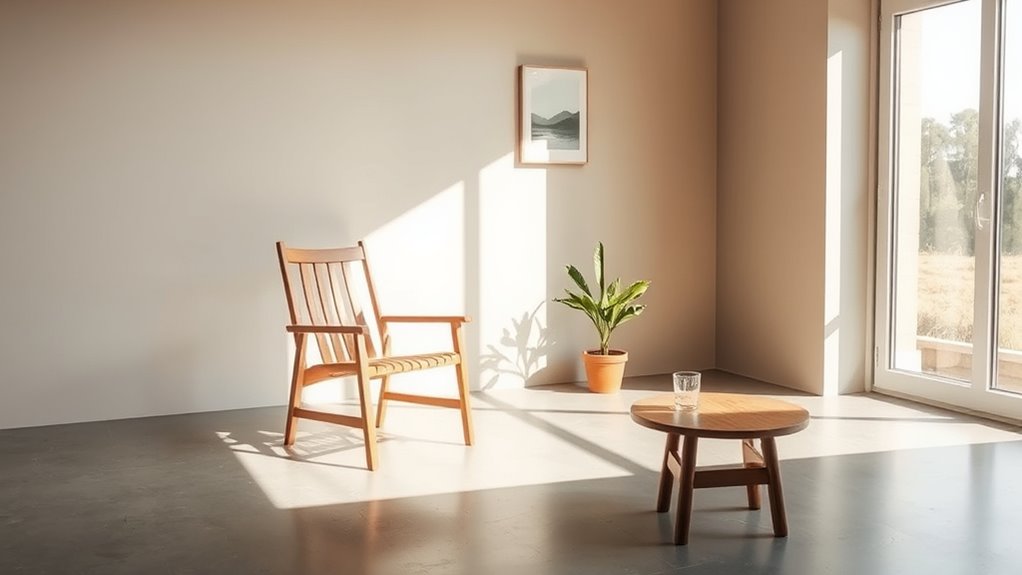
While many people chase after more possessions and distractions, minimalism offers a revitalizing alternative by inviting you to focus on what truly matters in your life. This lifestyle encourages you to reduce unnecessary items and cultivate a simpler, more intentional existence. By emphasizing quality over quantity, you start appreciating what you already own and develop a mindset of gratitude. Embracing sustainable living can further deepen your connections and enrich your life. Additionally, adopting eco-friendly practices can enhance your commitment to a minimalist lifestyle. Moreover, embracing halal lifestyles can provide additional layers of meaning to your choices and reinforce your values.
Simplifying your living space can enhance your productivity and mental clarity, allowing you to concentrate on meaningful activities and relationships. Instead of accumulating more, minimalism helps you embrace experiences that bring deeper fulfillment. Ultimately, it’s about making mindful choices that align with your values, leading to a more satisfying and serene way of living.
The Connection Between Minimalism and Sustainability
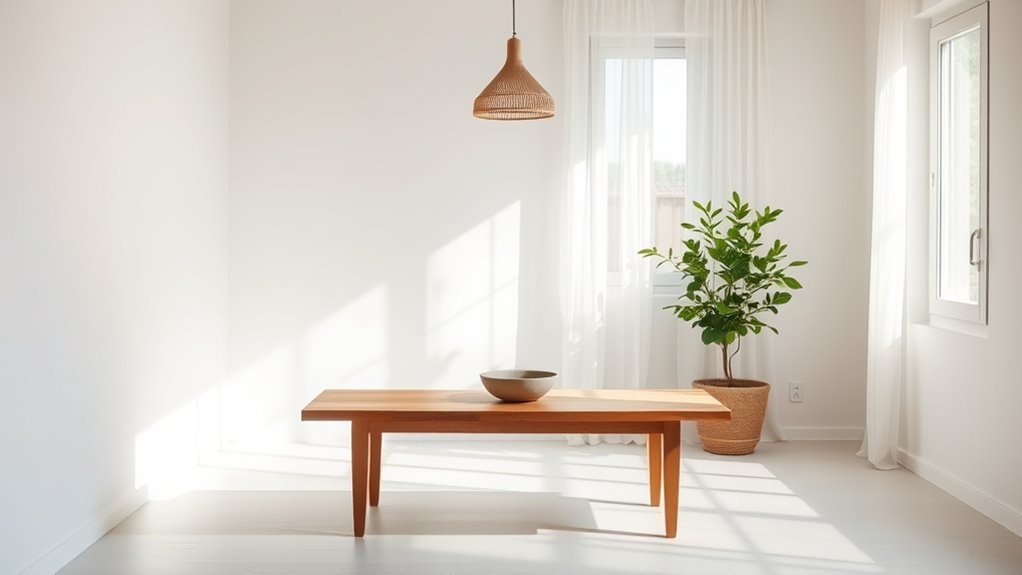
Minimalism isn’t just about simplifying your life; it also plays a significant role in promoting sustainability. By reducing consumption, you lower demand for products, which in turn decreases resource depletion and environmental harm. This principle of doing more with less resonates deeply within the framework of minimalism.
Focusing on quality over quantity means you choose durable items, aligning perfectly with sustainable principles. Adopting minimalist practices encourages waste reduction and mindful consumption, leading to less clutter and a smaller carbon footprint. You’ll find that embracing reusable products and eco-friendly materials not only supports sustainable manufacturing but also simplifies your life. Prioritizing local and organic choices minimizes transportation emissions and supports local economies. Additionally, the emphasis on investing in high-quality, durable items fosters a conscious approach to consumption that benefits both individuals and the planet. This approach mirrors the principles of efficient workflow found in various creative fields, emphasizing that making thoughtful choices can enhance productivity and sustainability. Furthermore, the rise of sustainable fashion highlights a growing trend towards eco-friendly materials and ethical production, reinforcing the connection between minimalism and sustainability.
Choosing durable items over numerous possessions aligns with sustainability, fostering mindful consumption and reducing waste for a smaller carbon footprint.
Ultimately, minimalism fosters intentional living, allowing you to make choices that reflect your values while positively impacting the environment.
Environmental Benefits of Embracing Minimalism
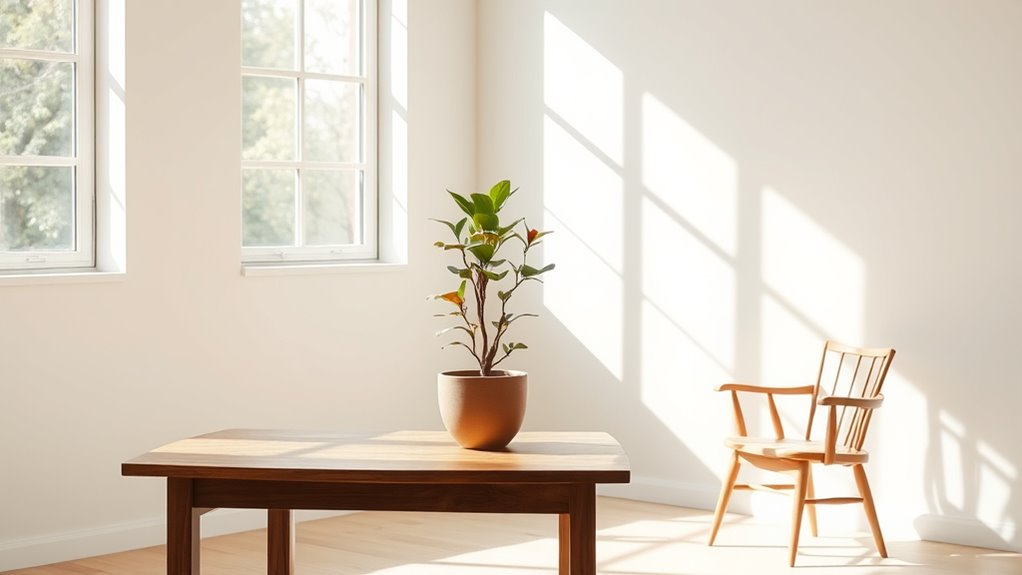
Embracing minimalism leads to significant environmental benefits that extend beyond personal well-being. By reducing waste and pollution, you limit packaging and single-use plastics, promoting a cleaner planet. Choosing second-hand items and slow fashion lessens textile waste and the demand for new, wasteful products. Smaller homes require less energy, encouraging energy-efficient habits and supporting renewable energy use. Additionally, smaller living areas encourage efficient use of materials and resources, making it easier to maintain a sustainable lifestyle. You also foster sustainable consumption by prioritizing quality over quantity, which reduces replacements and promotes eco-friendly products. Incorporating plant-based diets can further decrease your carbon footprint, aligning with minimalism’s principles. Research shows that nutrient deficiencies can be mitigated through a well-planned plant-based diet, enhancing overall health and sustainability. For example, including chia seeds in your diet provides essential omega-3 fatty acids that support heart health and reduce inflammation. Conscious living cultivates mindfulness about resource use, encouraging ethical choices with a lower environmental impact. Ultimately, minimalism not only simplifies your life but also plays an essential role in reducing greenhouse gas emissions and supporting a healthier planet.
Financial Freedom Through Minimalist Living

By adopting a minimalist lifestyle, you can access financial freedom and gain control over your spending habits.
You’ll likely cut down on non-essential costs, saving around $1,500 monthly. Lowering your living space can reduce utility bills by 25%, saving you about $1,650 each year. Additionally, downsizing living space can lead to substantial savings on housing costs, further enhancing your financial situation. Embracing good grief can also help you let go of unnecessary emotional and physical burdens, allowing you to focus on what truly matters. Regularly practicing nighttime meditation can further enhance your overall well-being, providing clarity and reducing financial stress.
Living in alignment with the Vortex can also bring about a sense of peace that supports financial decision-making.
With fewer possessions, maintenance costs drop, potentially saving you another $600 annually. You’ll also avoid storage fees and limit gift expenses, adding up to $500 in savings.
As you reduce your credit card debt, you could save $1,400 in interest yearly.
By saving or investing 40% of your income, you can build substantial wealth over time, paving the way for early financial independence.
Embrace minimalism, and watch your financial stress diminish.
Psychological Advantages of Simplifying Your Life
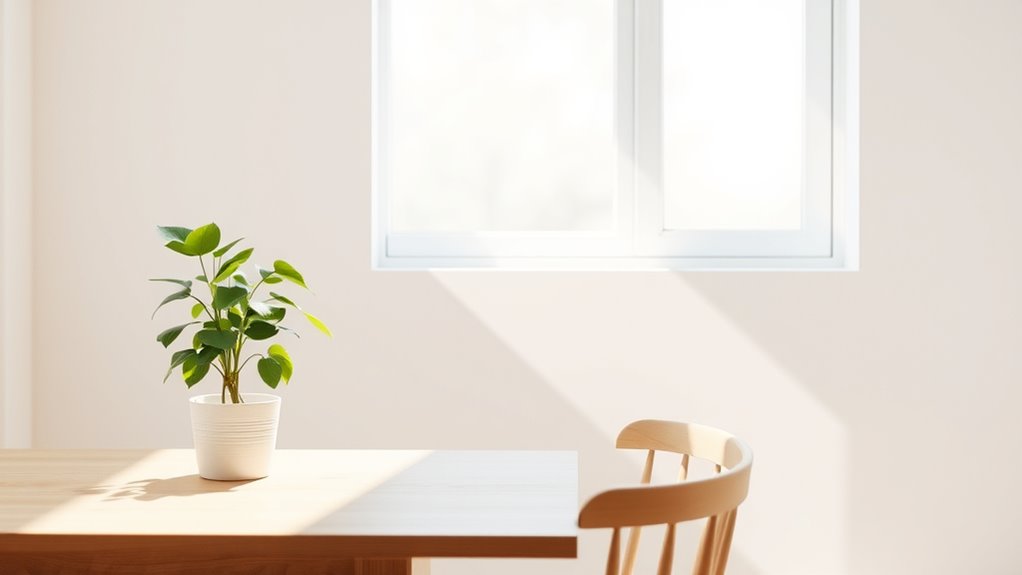
As you simplify your life, you’ll likely notice significant psychological benefits that enhance your overall well-being. Reducing clutter lowers stress and anxiety, creating a peaceful environment that fosters mental clarity. With fewer distractions, you’ll find it easier to focus on what truly matters, boosting your productivity. By prioritizing meaningful experiences over material possessions, you’ll cultivate greater life satisfaction and contentment. Simplifying also strengthens relationships, allowing you to spend intentional time with loved ones and deepen emotional connections. Furthermore, embracing simplicity encourages self-reflection, helping you align your choices with your core values. This journey not only clears your physical space but also nurtures your mental and emotional health, leading to a more fulfilling life. Additionally, a simpler life can significantly reduce stress, enhancing your overall mental and physical well-being. By creating organized environments, you can improve mood and foster a sense of calm that supports your emotional well-being. Moreover, adopting healthy habits such as regular exercise and balanced nutrition can further amplify your mental clarity and resilience. Engaging in mindfulness practices can also enhance your self-awareness, allowing you to better appreciate the benefits of a simplified lifestyle.
Practical Steps to Implement Minimalism and Sustainability
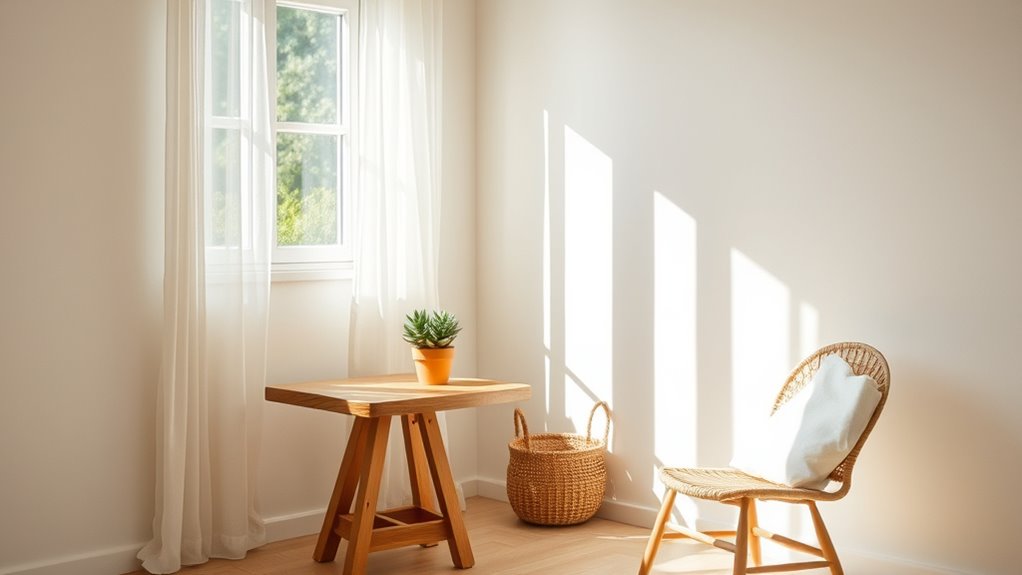
While diving into minimalism and sustainability might seem challenging, you can start with small, manageable changes that lead to a more intentional lifestyle.
Begin by decluttering your space—sort belongings into keep, donate, and discard piles. Implement the “Swedish Death Cleaning” method to gradually reduce clutter and enhance focus, which aligns with the principle of valuing quality over quantity. Additionally, consider the financial implications of your possessions, as assisted living expenses can be reduced by simplifying your living environment. A clutter-free space can also contribute to a sense of calm and functionality in your home. Incorporating natural materials like wood in your space can enhance both aesthetics and sustainability.
Simplify your daily routines by cutting unnecessary commitments and create a capsule wardrobe to streamline your closet.
Shift your consumption habits by prioritizing experiences and investing in quality, eco-friendly products. Consider borrowing items instead of buying.
Adopt sustainable practices like using reusable bags, opting for energy-efficient appliances, and practicing mindful shopping.
Finally, engage in community initiatives to promote eco-friendly habits and inspire others to join your journey towards minimalism and sustainability.
Frequently Asked Questions
How Can Minimalism Improve My Work-Life Balance?
Minimalism can greatly improve your work-life balance by helping you eliminate distractions and focus on what truly matters.
When you simplify your commitments, you free up time for self-care and meaningful experiences. It encourages you to set clear boundaries between work and personal time, preventing burnout.
Is Minimalism Suitable for Families With Children?
Yes, minimalism’s definitely suitable for families with children. It fosters creativity and social skills, as kids learn to share and cooperate with fewer toys.
You’ll notice improved emotional stability in a clutter-free space, reducing stress for everyone. By involving your kids in decision-making and making decluttering fun, you can teach them valuable life lessons about gratitude and intentional living.
Ultimately, minimalism can enhance your family dynamics while simplifying your daily routines.
Can Minimalism Help Reduce Anxiety or Depression?
Imagine walking into a room filled with balloons, each representing a worry or stressor. You can’t think clearly, right?
Now, picture that same room with just a few balloons. You feel lighter, more focused.
That’s how decluttering can help reduce anxiety and depression. By simplifying your space, you lower stress levels, enhance emotional well-being, and create a calmer mind, allowing you to embrace life’s moments without the weight of excess clutter.
What Types of Experiences Should I Prioritize Over Possessions?
You should prioritize experiences that enrich your life and foster connections.
Travel to immerse yourself in new cultures, or engage in local community events to build relationships.
Invest in learning programs that enhance your skills and join social clubs to expand your network.
Don’t forget creative hobbies—painting or writing can be fulfilling.
Finally, volunteer your time, as helping others strengthens your sense of purpose and community connection.
These experiences create lasting memories.
How Do I Maintain Minimalism During Holidays and Special Occasions?
You might worry that minimalism takes away from holiday joy, but it can actually enhance it!
To maintain minimalism during holidays and special occasions, focus on experiences instead of material gifts. Prioritize meaningful activities with loved ones, and communicate your preferences for gifts.
Choose quality over quantity in decorations, and simplify your celebrations by creating new traditions that emphasize connection and mindfulness. This approach brings fulfillment without the clutter.
Conclusion
By adopting minimalism, you’re not just simplifying your life but also making a significant impact on the planet. Did you know that if everyone reduced their consumption by just 10%, it could cut global waste by over 20 million tons a year? Embracing a minimalist lifestyle frees you from clutter, fosters financial stability, and enhances your mental well-being. So, start small—let go of what you don’t need, and watch how it transforms both your life and the environment.









